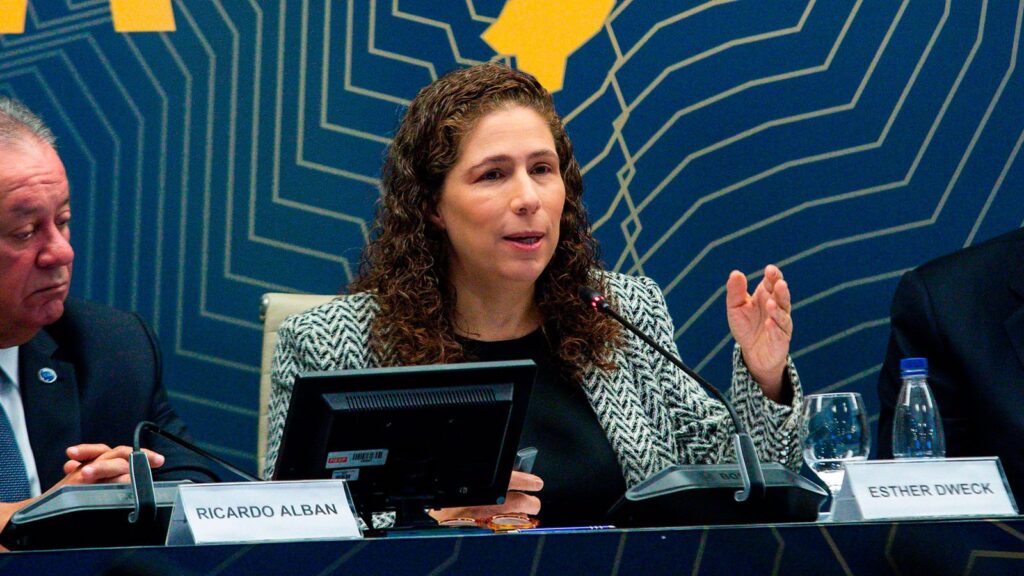
On the morning of Monday (March 24), the Minister of Management and Innovation in Public Services, Esther Dweck, presented the State Transformation project led by the MGI during a meeting promoted by the Federation of Industries of the State of São Paulo (Fiesp) to discuss pathways for the modernization of the State. The event brought together representatives from the public sector, experts, and institutions to debate proposals for modernizing public administration. The minister reaffirmed the government’s commitment to a State transformation model already underway through the MGI, based on sustainable development, the appreciation of public servants, and the improvement of public services.
For the Ministry of Management, more than an administrative reform (the name Fiesp gave the event), it is essential to ensure a process of evolution in public administration that embraces diversity, fosters dialogue with society, and points toward a more efficient, digital State that delivers better public services.
“The transformation of the State is already underway and began with the very creation of the MGI. We chose not to call it administrative reform, as that term carries a heavy connotation of State reduction. We are working on improving public management, not only at the federal level, with the goal of enabling the State to lead a development process that is socially just, environmentally sustainable, and economically viable,” said the minister.
Dweck also emphasized the importance of building structural changes with social participation and transparency, ensuring that any modernization preserves the quality of services and values public servants. “The State must be innovative, efficient, and act as a leader in the transformation process. In our view, this process is continuous and incremental. There are several legislative changes that need to be made, but constitutional change is not the main focus,” she stressed.
The meeting was attended by ministers, members of parliament, and experts who discussed different perspectives on the future of public management in Brazil. Josué Gomes, president of Fiesp, highlighted the entity’s view on administrative reform.
“We at Fiesp do not see administrative reform as a tool to immediately reduce the cost of the State; we see it as a means to increase the quality and efficiency of public services for citizens and Brazilian companies. This will result in cost reduction over time,” said Gomes.
He also praised the Ministry of Management’s initiatives to enhance controls against the misuse of resources, increase security in service delivery, and improve efficiency through technological tools. In addition, he stressed the need for a statute that ensures public servants have adequate conditions to transform the State safely.
“We need to support high-performing civil servants and help them thrive, while also ensuring that everyone can reach their full potential. We believe that new legal statutes are needed to achieve this goal, and we believe that the time has come for Brazil to address this issue,” he emphasized.
Among the guidelines addressed by Fiesp are the redefinition of decision-making processes to ensure greater efficiency and legal certainty, granting more autonomy to public administration organizations for more strategic management, and limiting compensatory allowances to effectively enforce the salary cap.
Other topics discussed included the redesign of public careers, the creation of a transparent performance evaluation system, and improvements to civil service exams. Additional issues covered included the strengthening of data security and sovereignty, as well as improvements in mechanisms that encourage innovation and the digitalization of the public sector.
Supreme Federal Court Justice Gilmar Mendes emphasized that digitalization has significantly transformed public service, making services faster and more accessible. “There has been a major transformation of public service and life in general through automation. The government now has a very interesting and well-developed platform in this regard, with many services available through these platforms and our automation capabilities,” he stated, referring to GOV.BR as a platform that provides access to more than 4,500 digital public services.
MGI’s Agenda for State Transformation

Minister Esther Dweck argued that the federal government’s proposal prioritizes a transformation that strengthens public service, expands innovation, and ensures greater efficiency without compromising rights or undermining the work of public servants. According to her, digital transformation is a pillar that must be led by the State.
“We have been working on the concept of secure and sovereign public digital infrastructures, treating data as strategic assets and facilitating access to quality public services for the population at all levels of the federation,” she said, citing programs such as the National Identity Card (CIN), which registers 1.7 million issuances per month and is already approaching 23 million CINs issued across the country.
Célio Ribeiro, Executive President of ABRID and founder and CEO of InterID, also highlighted the importance of this progress in the modernization of the State:
“The digital transformation work being carried out jointly between the public and private sectors, under the leadership of MGI through the Secretariat for Digital Government (SGD), brings enormous benefits to the Brazilian population. We are witnessing a unique moment where the public digital infrastructure of civil identification will be the major platform to ensure inclusion, rights, and access to public and private services with agility and security.”
She also emphasized the need to qualify the public service workforce to ensure the delivery of quality services.
“We have been working hard on the issues of engagement and diversity. Diversity allows us to have better public policies and better service quality. The new public servants coming in will go through a continuous digital literacy training process so they can start with a digital mindset,” she said, citing the Unified National Public Service Exam as one of the tools that enables interaction between the public sector and society for the modernization of the State.
The minister also stressed the importance of implementing a performance evaluation system for public servants, both for the probationary period and for career progression.
“For the first time, we have regulations for the probationary period, and we have been working in the area of performance evaluation, proposing a system that also serves as a criterion for career advancement. For us, it is important that public servants are evaluated. And this is something that benefits public servants as well.”
For Esther Dweck, a well-structured evaluation system not only ensures the efficiency of public service but also recognizes and rewards public servants for their good performance.
Finally, the minister highlighted the importance of sharing technological solutions and national strategies with states and municipalities, noting that this practice leads to significant cost reductions in the public sector. She mentioned government initiatives led by her ministry, such as Contrata+Brasil, Imóvel da Gente, and the ComprasGov portal.
“Sharing services can truly transform the Brazilian State, promoting greater efficiency with effectiveness. We must focus on government outcomes, always considering diversity and maintaining open dialogue with society at all levels,” she concluded.




